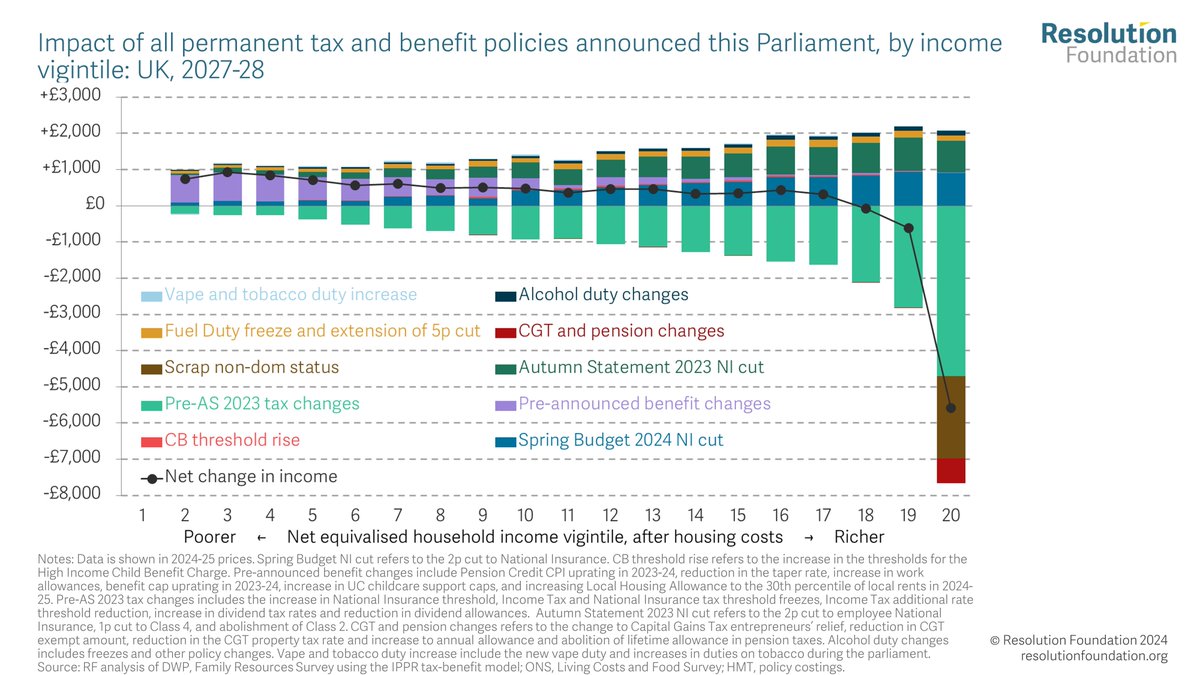Starting now! Wealth booms and debt burdens: How Britain’s recent economic history and outlook affects different generations. Watch our latest event with @ConnectingGens here resolutionfoundation.org/events/wealth-… 

@ConnectingGens Kicking off his presentation, James Sefton notes that his works aims to assess resources and transfers between generations, including private transfers within families and state transfers. Brace yourselves, this is a massive piece of research! 

@ConnectingGens Introducing his work he said that state transfers are looking more equitable than many might expect, However, private consumption trends across generations are 'perilously unsustainable'... 

@ConnectingGens Starting with the labour market, James notes that the share of labour income across generations has remained remarkably stable over time - though everything has shifted right - young people are starting careers later, older generations are retiring later too 

@ConnectingGens Moving on to wealth, James highlights the scale of the boom Britain has experienced, primarily pensions and property. It is highly unequally distributed... 

@ConnectingGens Though he adds that lower returns to wealth have offset some of these wealth gains. A new period of rising interest rates and falling house prices could start to reverse these long-standing trends.... 

@ConnectingGens The distribution of Britain's wealth boom:
- Older generations since 2000 have benefited from the wealth boom.
- Current younger generations have not, they have less wealth than earlier generations
- Older generations since 2000 have benefited from the wealth boom.
- Current younger generations have not, they have less wealth than earlier generations

@ConnectingGens Will older generations pass on this wealth boom? Yes, 70-80 per cent is likely to be passed down one or two generations. But that's cold comfort for the many young people whose parents or grandparents aren't wealthy. 

@ConnectingGens Moving on to the public sector, James says that while public sector debt has increased, public sector net worth (ie its assets) have fallen off a cliff, and public transfers have shifted towards older generations. 

@ConnectingGens What does this all mean for consumption - a key metric for living standards? It has grown for older generations, mainly through higher public consumption. Since 2010, consumption has fallen for age groups under the age of 60. This is what recessions and stagnation do for society. 

@ConnectingGens Do generations have enough resources to fund their consumption. Yes, for older generations but not for young generations. But the level of private bequest flows down the generations are enough to ensure that all generations have enough resources.... 

@ConnectingGens However, in contrast to private transfers between generations, public transfer are flowing up the generations. Families are doing their best to ensure intergenerational equity, but the government isn't..... 

@ConnectingGens And Jane Falkingham responds to James with some provocations. First up, James' work looks at aggregate data, but what about gender? Here there are some big generational differences.... 

@ConnectingGens Because while male participation rates in the labour market are high but falling.... 

@ConnectingGens ...female participation rates are lower but rising (sharply) from generation to generation.... 

@ConnectingGens Second, Jane says longer lives mean we need to rethink the meaning of age - 75 is the new 50! 

@ConnectingGens Rethinking the meaning of age means societal shifts - later marriages, more divorces... 

@ConnectingGens ...the age of motherhood is increasing, and there are more childless families. This increases (age-based) distances between generations, and will impact on the private wealth generational transfers that James says are vital for upholding younger generations consumptions patterns. 

@ConnectingGens And now onto our Q&A, chaired by Lord Willetts. He notes that there are huge distributional challenges to a society that relies too much on private inter-generational transfer to fund future consumption. Why? Because wealth is unequally distributed within generations. 

@ConnectingGens Britain has a productivity problem and an inequality problem, but does it have an intergenerational problem too? Only in the public sector, says James Sefton, there is no conflict in the private sector, where generations are working together (and not just through transfers). 

@ConnectingGens David pushes back slightly against James. He says that from a intergenerational perspective, his baby boomer generation are better as family members than citizens. Happy to pass down property wealth, but not to generate new property wealth by accepting more house building.... 

@ConnectingGens David wraps up our event by saying that if Britain moves to a society where inheritance plays an increasing role in determining economic outcomes then family will matter more, and that could reduce young people's geographic mobility (with knock-on effects for productivity). 

• • •
Missing some Tweet in this thread? You can try to
force a refresh














